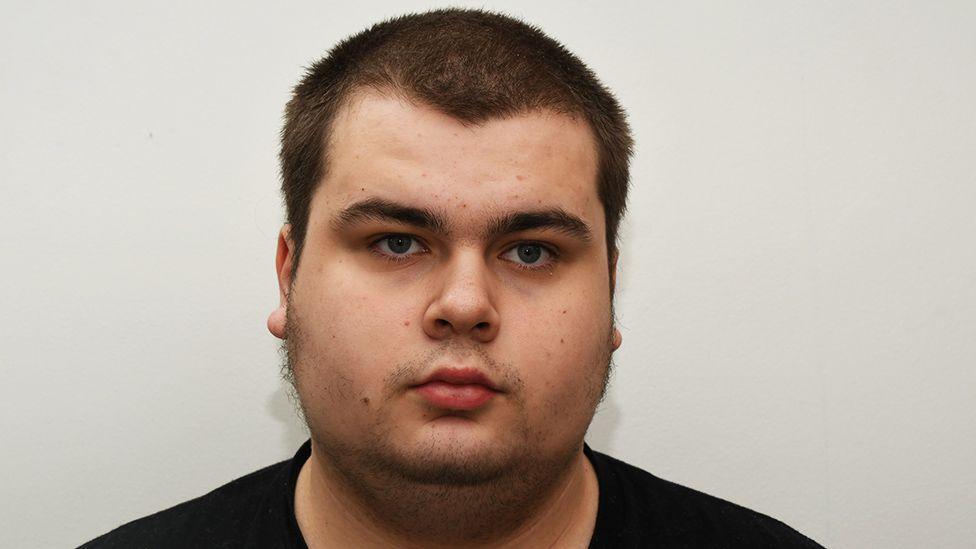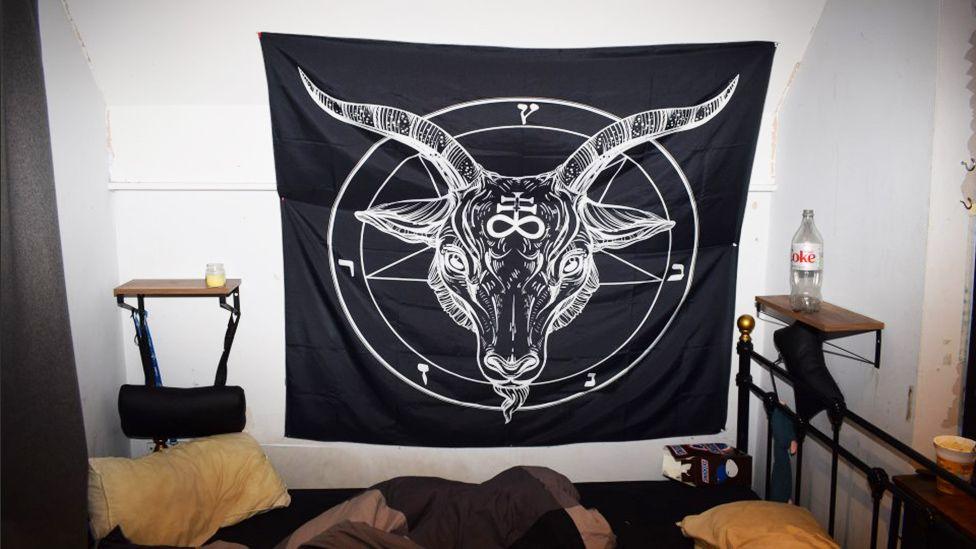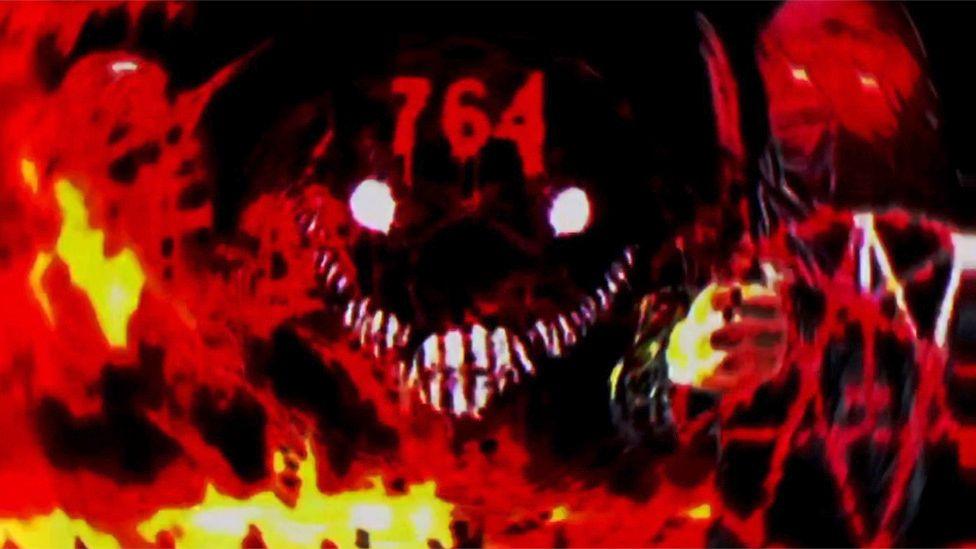Abuse terror warning as 'Satanist' teenager jailed

- Published
A teenager involved in what police have described as a Satanist terror network targeting children online for sexual blackmail and violence has been jailed for six years at the Old Bailey.
Cameron Finnigan pleaded guilty to encouraging suicide, possessing a terrorism manual, and indecent images of a child.
The court heard the 19-year-old from Horsham was part of an extreme right-wing Satanist group called 764, which anti-terror police warn poses "an immense threat".
At least four British teenagers have been arrested in connection with the activities of the group, which has blackmailed children - mainly girls - into carrying out sexual acts, harming themselves or or even attempting suicide.
Warning - this article contains distressing content
At a previous hearing Finnigan admitted five charges and he has now been given a six-year sentence with an extended three-year licence period.
Mr Justice Jay said he posed "a high risk of serious harm to the public".
Finnigan was arrested in March 2024 after police received information that he had a gun.
No firearm was found at his home but after analysing his digital devices, officers found online chats where he encouraged one young female, believed to be in Italy, to livestream her own suicide.
Officers have been unable to identify this woman and do not know what happened to her.
In online chats Finnigan boasted to other members of 764 about his attempts to get children to hurt themselves.
Det Ch Supt Claire Finlay, head of Counter Terrorism Policing South East, says the members competed to see who was the most extreme: "If you can get someone to self-harm, you're doing quite well in that group. If you can get them to kill themselves, you're reaching the pinnacle."
In a police interview, Finnigan was asked about a woman he tried to persuade to kill herself
An 11-page PDF document was also found on Finnigan's computer, giving detailed instructions on how to carry out a "mass casualty" terrorist attack using a lorry, firearm or knives.
And on the Telegram messaging platform, he and other members plotted what they called "terror week".
He told the group he planned to murder a homeless man living in a tent near his home, and even posted pictures of the location.
"I won't stop until he's dead," he wrote online.
"This case has been very shocking," said Det Ch Supt Finlay. "Cameron Finnigan was dangerous. There was a threat to public safety there."
'An immense threat'
The 764 network was founded in 2020 by a US teenager, Bradley Cadenhead, who was then 15. It is believed to be named after the partial postal code of his hometown in Texas.
Police say it is part of a loose, international network of far-right extremist groups that have adopted what officers call "militant accelerationist ideology".
Those who have researched the groups say they seek to destroy modern, civilised society by committing depraved acts of violence and sexual exploitation - often involving children.
Cadenhead was arrested in 2021 and is now serving an 80-year prison sentence in Texas for the creation of videos in which children were not only being sexually abused, but also choked, beaten, suffocated and seriously injured.
The network uses Nazi and Satanist imagery. Finnigan, who went by the online username "Acid", adorned his bedroom in West Sussex with swastikas and pentagrams.
In one online post, he wrote: "Acid is Hitler's child".

Finnigan's bedroom was decorated with pentagrams and swastikas
Last year, the FBI released an unprecedented warning about 764, saying it "uses threats, blackmail, and manipulation to control the victims into recording or live-streaming self-harm, sexually explicit acts, and/or suicide".
Now British police have issued their own warning.
"We want to make the public aware of [764]," said Det Ch Supt Finlay. "The threat that they pose, not just within the United Kingdom but globally, is immense."
It is not known how Finnigan became involved in the group.
The BBC has spoken to one person who knew him well. They told us his behaviour had changed when he became involved with other extremists online.
"They shared all the horrible, awful stuff between each other. That's when he went from being caring and loving to manipulative, toxic, controlling and sadistic," they said.
"He never showed any guilt, he would actually boast about it with friends as if he enjoyed the suffering and found it entertaining. It was disgusting and completely inhumane."
'Nightmare-inducing stuff'
Becca Spinks is a US-based internet investigator who has studied the group.
"They'll try to coerce and persuade young vulnerable people to self-harm, take a razor blade and carve their abuser's name into their body on video," she said.
Ms Spinks identified Finnigan as a 764 member before he was arrested. He then contacted her and, in messages seen by the BBC, he threatened to rape and kill her.
"I very quickly realised that I had kicked a really nasty hornets' nest," Spinks told us. "The FBI told me that this group was very violent and very dangerous. It's horrific, nightmare-inducing stuff."
Arrests related to 764 have been made for child abuse, kidnapping and murder in at least eight countries, including the UK.
Last year, Vincent Charlton from Gateshead, then 17, was jailed for disseminating terrorist publications, possessing documents useful to a terrorist, and making and possessing indecent images of children.
The BBC has found online that 764 is still active worldwide and has seen messages where group members boast about their exploits, sharing photos and videos of their victims.

Members of 764 shared disturbing video images such as this one
Typically, the group will seek out vulnerable young girls on social media, often in communities dedicated to self-harm or mental health. They communicate with them on messaging platforms such as Discord and Telegram, often sending sexually explicit child abuse material.
A spokesperson for Discord told us that it had reported Finnegan to authorities in the US, and added that the platform was committed to addressing harmful content.
Jenna (not her real name) from Australia, was 15 when she was first targeted by 764.
For more than two years, she was threatened by members of the group.
"It was horrible," says Jenna's mother, who spoke to us anonymously. "We have suicide manuals that they sent to her."
The group also sent Jenna images of child and animal abuse, and coerced her into sharing explicit pictures of herself, and self-harming on camera.
Jenna's mother told us that the group had got her daughter to mutilate herself more and more. "Deeper. Worse. She's covered in scars."
Eventually, the abusers ordered Jenna to kill her family's cat and she refused to comply.
"They wanted her to do that on a livestream. It all blew up from there. When she refused to do that, I think they realised they were losing control of her," said her mother.
In revenge, 764 members made a fake police report, claiming that Jenna's father had a gun - a common tactic known as "swatting". Armed Australian police came to the house, terrifying the family.
Some of Jenna's abusers have now been arrested and are serving prison sentences in the United States.
But others are still at large. While she has mostly managed to cut ties, Jenna continues to receive threatening messages. Her mother is still trying to get the explicit images removed from social media sites.
"I spent months being able to see that these people are able to access the worst things that you could imagine of your child. And just screaming into the void like, nobody's listening, nobody's taking this stuff down. How is it still up? And it's not just my child, it's so many kids."
Jenna is still traumatised by her experiences with the group.
"Be really careful of who you're talking to," she says. "And if it happens to you, talk to someone about it."
If you have been affected by the issues raised in this article, help and support is available via BBC Action Line.
Get in touch
Have you been affected by issues discussed in this story?